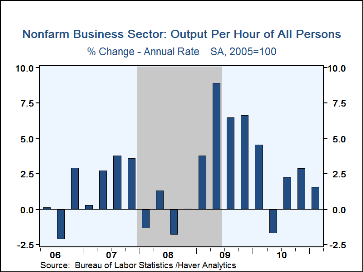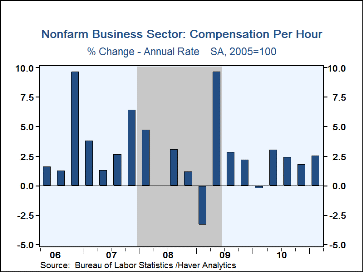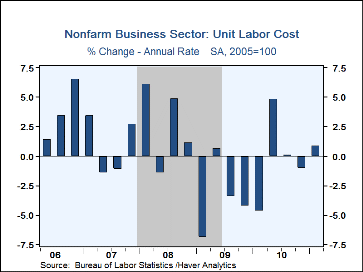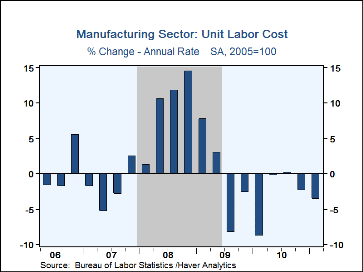 Global| May 05 2011
Global| May 05 2011U.S. Labor Productivity Slows
by:Tom Moeller
|in:Economy in Brief
Summary
The current economic slowdown is taking a toll on worker productivity. Labor productivity in the nonfarm business sector rose 1.6% last quarter, the slowest gain since Q2'10. Productivity is calculated by dividing an index of real [...]
The current economic slowdown is taking a toll on worker productivity. Labor productivity in the nonfarm business sector rose 1.6% last quarter, the slowest gain since Q2'10. Productivity is calculated by dividing an index of real output by an index of hours worked by all persons. During Q1, real output rose 3.1% (AR, 3.2% y/y), the least since Q2, while hours worked rose 1.4% (1.9% y/y).
The slowdown in productivity growth was accompanied by a pickup in compensation. The 2.6% q/q increase lifted the y/y gain to 2.5%. Together, these figures raised unit labor costs by a still-modest 1.0% which followed declines during both 2010 and 2009.
Factory sector productivity did not suffer the effects of slower growth last quarter. In fact, productivity rose an accelerated 6.3% due to a strengthened 9.7% increase in output (7.1% y/y) while hours worked rose 3.3% (2.3% y/y). As compensation costs rose at a stable 2.6% rate, unit labor costs fell 3.5%.
The productivity & cost figures are available in Haver's USECON database.
Facts on the Distributions of Earnings,Income, and Wealth in the United States: 2007 Update from the Federal Reserve Bank of Minneapolis can be found here here.
| Productivity & Costs (SAAR,%) | Q1'11 | Q4'10 | Q3'10 | Q1 Y/Y | 2010 | 2009 | 2008 |
|---|---|---|---|---|---|---|---|
| Nonfarm Business Sector | |||||||
| Output per Hour (Productivity) | 1.6 | 2.9 | 2.3 | 1.3 | 3.9 | 3.7 | 1.0 |
| Compensation per Hour | 2.6 | 1.9 | 2.5 | 2.5 | 2.3 | 2.0 | 3.3 |
| Unit Labor Costs | 1.0 | -1.0 | 0.1 | 1.2 | -1.5 | -1.6 | 2.2 |
| Manufacturing Sector | |||||||
| Output per Hour | 6.3 | 5.1 | 2.1 | 4.7 | 5.8 | -0.4 | -0.4 |
| Compensation per Hour | 2.6 | 2.7 | 2.5 | 3.2 | 2.0 | 5.6 | 4.0 |
| Unit Labor Costs | -3.5 | -2.3 | 0.3 | -1.4 | -3.7 | 6.0 | 4.5 |
Tom Moeller
AuthorMore in Author Profile »Prior to joining Haver Analytics in 2000, Mr. Moeller worked as the Economist at Chancellor Capital Management from 1985 to 1999. There, he developed comprehensive economic forecasts and interpreted economic data for equity and fixed income portfolio managers. Also at Chancellor, Mr. Moeller worked as an equity analyst and was responsible for researching and rating companies in the economically sensitive automobile and housing industries for investment in Chancellor’s equity portfolio. Prior to joining Chancellor, Mr. Moeller was an Economist at Citibank from 1979 to 1984. He also analyzed pricing behavior in the metals industry for the Council on Wage and Price Stability in Washington, D.C. In 1999, Mr. Moeller received the award for most accurate forecast from the Forecasters' Club of New York. From 1990 to 1992 he was President of the New York Association for Business Economists. Mr. Moeller earned an M.B.A. in Finance from Fordham University, where he graduated in 1987. He holds a Bachelor of Arts in Economics from George Washington University.
More Economy in Brief
 Global| Feb 05 2026
Global| Feb 05 2026Charts of the Week: Balanced Policy, Resilient Data and AI Narratives
by:Andrew Cates










